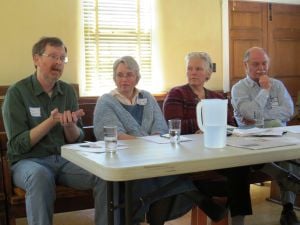04/07/2014
Quakers and the EnvironmentFracking the Marcellus Shale from a Quaker perspective
What do Pennsylvania Quakers think of Marcellus Shale fracking in their midst?
Not much good.
Three northern Pennsylvania Quakers living amid fracking in northern Pennsylvania, and a Penn State professor who’s studied the economic impact of natural gas development on communities, gathered in Lancaster Sunday afternoon for a panel discussion: “Living on Shale: A Quaker Perspective.”
At the Lancaster Friends Meeting, they addressed about 100 people, many of whom came with a newly heightened nervousness about Marcellus Shale after learning of a 35-mile natural gas pipeline proposed to run nearly the length of the county.
Margaret Wood, who moved from New York City to Bradford County to raise a family, described “an assault by the gas industry” on beloved land that had been in her husband’s family since 1840.
“First they frack the community, then then they frack the land,” she said, at one point tearfully. “If you’re familiar with the tragedy of the commons, that is what happened to us. We could not hold together as a community.
“They set neighbor against neighbor. Families break up, family farms break up, fights happen. The greed and outrage machines begin on both sides. Bullying arrives.”
By 2008, all the Woods’ neighbors had leased their land for gas drilling. Her family became what is called a “donut” property, and they were the hole.
Finally, she said, the family relented and leased their land with a no-surface-disturbance contract because if there was a spill, “we would have no place at the table to protect our land.”
Bryn Hammarstrom told how he moved from Bucks County to Tioga County in 1971 as a 24-year-old back-to-the-land hippie. Now 67 and a recently retired nurse, he is saddened by that part of the state’s transformation from what is marketed as the “Pennsylvania Wilds” to a hotbed of fracking.
The Wellsboro Meeting that he is involved in in 2010 was successful in getting Quaker groups throughout the state and southern New Jersey to support the call for a moratorium on gas drilling in the Marcellus Shale “until rigorous regulatory oversight ensures environmental safeguards.”
Hammarstrom noted the church hoped the resolution would attract support from other denominations, but that did not happen. “It shows the division of fracking,” he said.
Another Quaker panel member, Dr. Tim Kelsey, a professor of agricultural economics at Penn State, was quick to tell the group he was neither for nor against fracking in Pennsylvania.
But he listed a number of developments in the state’s mountain communities he finds troublesome.
“There very clearly are economic benefits out of this Marcellus Shale activity,” he said. But he quickly added the caveat, “Who are those jobs going to?”
His examination of wage and state income tax records indicate many of the new earnings are going to workers not from the communities near the drilling pads.
“A significant amount of the employment effect is going to nonresidents,” he said.
The total tax income of Tioga County rose 20 percent between 2007 and 2010, he noted, but the lion’s share was largely due to lease and royalty dollars by some landowners.
“Some people are making a lot of dollars (from Marcellus Shale). But the majority of the residents are not making much money, if at all,” he said.
Moreover, he suggested gas drilling is having negative social impacts on some residents in drilling communities.
With rents being tripled and quadrupled to house workers, low-income families are being driven away.
“That social disruption of people moving out versus staying put, as well as polarization between neighbors, is something having a significant effect on those communities.”
Both state and local officials need to wrestle with what happens when the gas runs out, he suggested.
“It’s very clear that this is a short-run impact. So the question is, to what extent are they using the resources now to be able to leave the communities better off in the long term than they are now? Or is the focus much more on just short-term gain?
During a question-and-answer session, several people from southern Lancaster County sought advice on how to organize against negative impacts they feel the Penn Central Line could have on their properties and the environment.
“Do a lot of listening. Find a commonality and lower the outrage machine,” suggested Wood. “Just know if you’re divided as a community, you’re just allowing yourself to be fractured.”
Kelsey noted the Marcellus Shale drilling happened quietly with a scant flow of information in northern Pennsylvania.
“You have the opportunity here at least to share information,” he said. “Share information as clear and transparently as possible so everyone’s working for the same element.
“Provide many public opportunities for people to talk and vent, and listen as much as possible.”

No comments:
Post a Comment